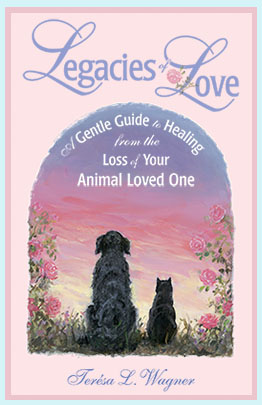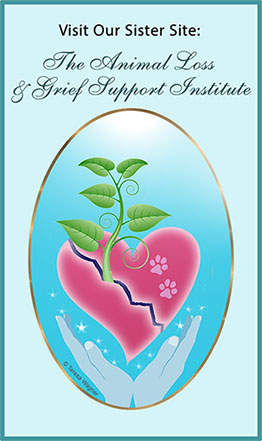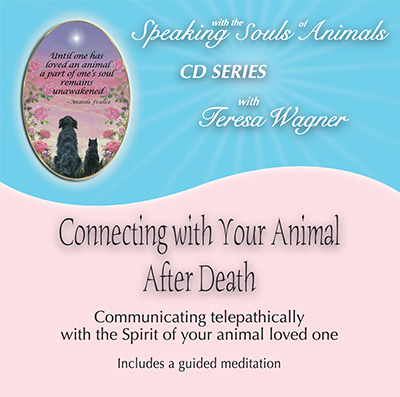Pet Loss Grief Support
Twelve Ideas on Coping and Finding Comfort
The first component of healing from grief is coping and finding comfort to survive the present: to find ways to keep on going, to get through our loss with grace and with support, to find safe places and ways to express our feelings, and to come to know that each feeling is normal. I sometimes think of this as the emotional first aid period. We need emotional first aid at the time of our loss as much as we'd need physical first aid at the site of an accident. Here are some specific actions we can take to help ourselves cope and find comfort:
-
To find any sense of comfort at all, we need to acknowledge that we are just as important as our beloved animals who have died or are lost. We do not dishonor them, or their memory, by honoring and taking care of ourselves. On the contrary, our animals would want us to take care of ourselves. It is a myth that a prolonged state of suffering and misery is a testament to our love for our animals. A mature, enduring testament of love includes loving and caring for ourselves as much as we do our animals.
-
Take more time now to nurture yourself. Do things that you know bring you a sense of serenity, peace or calm. Take quiet walks in nature, spend reflective moments in prayer or meditation, soak in a bubble bath, get a massage. Indulge yourself with healthy escapes that can bring you pleasure and relief from the heavy emotions of grief. Go shopping, watch good movies (better yet funny movies!), go out for a good meal, read a good book, allow yourself time for your favorite hobbies. If you need more time to be alone than is usual for you, that's OK, do what you need to do. To support your full healing, consider seeking the help of an energy healer, such as a practitioner in therapeutic touch or Reiki, or a grief counselor. You may also want to take flower essences to bring ease your emotional pain and add the energy of grace to your grief. I highly recommend the formula Grief Relief. You are recuperating, just as you would be if you had had surgery. Be gentle with yourself as you grieve the loss of your beloved pet. Give yourself time to heal.
-
Know all your feelings are normal and express them. Grief often involves what can seem like an avalanche of contradictory feelings. One minute we could be feeling a yearning for our beloved animal so deeply we wonder if we'll ever feel stable again. The next minute we might feel relief from the anxiety, strain or ambiguity which may have been part of the illness or death. Then we might feel guilty for feeling relief! Whatever feelings we have at any time, in any order, and in any intensity, they are normal. The important thing is to not judge ourselves for any thoughts or feelings. But rather to find safe places to express them, such as with supportive friends and family, with a counselor, in a support group, in a journal, through listening to music, through drawing or other art work, in meditation, prayer, or talking directly with the spirit of our animal who has died or is lost.
My Personal Pet Remembrance Journal by Enid Traisman, MSW is an excellent, comforting resource for expressing our feelings about our loss. Children may especially enjoy and find healing from the book Paw Prints in the Stars by Warren Hanson, in which they can memorialize and write about their pets. Two other highly recommended books for expressing our grief and healing creatively are Managing Traumatic Stress Through Art: Drawing from the Center, by Barry Cohen, Mary Michola Barnes and Anita Rankin and SoulCollage by Seena Frost.
At my Legacies of Love workshops participants make a "memorial tribute box" with fabrics, paints, etc. to serve both as a physical place to reverently store sacred items such as pet leashes, fur, collars and pictures as well as to provide a creative process to express our feelings of love and grief. We also draw the feelings of our hearts. These examples remind us that expressing our feelings does not always mean talking with other humans. -
Let your tears come. Let them flow. Let them cleanse you. Don't stuff them inside, choking yourself. And don't apologize for crying. Saying "I'm sorry" sends the message that we believe we have no right to express ourselves, or that in the midst of our grief we're also responsible for another's discomfort. We aren't. If someone else feels uncomfortable when we cry, we don't need to apologize. It discounts our right to feel and to mourn. Try saying "thank you for letting me cry (or talk) with you." This confirms to us and the other person that we have a right and a need to talk and sometimes cry. It also expresses appreciation and reinforces their support. If we feel awkward crying in front of someone, we might say something like "I feel funny crying in front of you but I can't help it, I must cry."
-
You are not crazy if you feel the spirit of your animal close to you, hear them speak to you, or see their image. These experiences are normal and common, both among people who've lost their animal loved ones and thoes who've lost their human loved ones. Some call these experiences hallucinatory, or paranormal. Because this term connotes "almost, but not quite normal" I prefer to use the terms metaphysical or spiritual for these experiences. The dictionary defines para as "closely resembling, or almost," and defines meta as "more comprehensive or transcending." Feeling the energy or the spirit of our deceased loved ones is not an almost normal experience, it's a normal experience--a comprehensive, transcendent experience of the heart, not an aberration of the mind. Love doesn't die, only matter dies, so of course we can still feel the loving presence of our animals in various ways. Let it comfort and soothe you. You may find comfort from reading about others' experiences in the pet loss books Animals in the Afterlife, Animals in Spirit, and Blessing the Bridge. It may also be supportive to hear about some of my clients' stories in my teleclass Animals' Perspectives of Death, The Other Side and Coming Back. This class is usually held twice a year, and is also available On Demand so you can listen to it whenever you like. To help you communicate with the spirit of your beloved animal directly, you may want to listen to the guided meditation in Connecting with Your Animal After Death.
-
Know that a physical response to loss is to be expected ~ it is normal. We may experience changes in appetite or weight, in sleep patterns, or our sex drive. We may easily lose concentration, become fatigued, develop headaches, degestive problems, heart palpitations or any number of other physical symptoms. Know they are all normal and part of the grief process. Though most symptoms will rebalance as our grief reconciliation process continues, see your doctor if symptoms persist or are severe. Meanwhile, take care of yourself with plenty of rest, moderate exercise, and a nutritious diet. Your emotional heart is injured now, and taking gentle care of your body increases your resiliency to this emotional injury and helps accelerate healing.
-
We can also increase our physical and emotional resiliency through vitamins and other natural supplements. Stress depletes the body of certain nutrients, so our body requires more than the usual amounts when we're in distress. Talk to your health professional about foods and supplements which may be appropriate for you.
Flower essences, available in most health food stores, are very powerful sources of comfort and healing when we grieve. My favorite flower essence blend for grief is FES's Grief Relief, which helps us feel stabilized when emotionally traumatized or overwhelmed by our grief. It's an excellent remedy to keep nearby in your pocket or purse during the most intense time of your grieving. Taking a few drops at those moments of panic, when we wonder how or if we will make it through, is very soothing and calming. It helps ease the pain of brokenheartedness and anguish when we have lost a loved one and to accept the change in form of a relationship, to let go, and release our attachment to the physical form of our animal loved one. It helps us accept that they have died, while still fully feeling the spiritual connection of love. It also helps us overcome feelings of depression and heavy-heartedness from the death or impending death of a loved one, giving us courage to face our grief, a sense of upliftment and bouyant hope to help us not get stuck in the weight of depression.
I don't believe that any substance, any spiritual belief system or the most loving support in the world can take away the emotional pain of grief when our animals die. Loss and its subsequent pain are natural, inevitable experiences of life. Pain, however, does not have to include the quality of suffering. Suffering isn't necessary. Pain can be surrounded instead with the quality of quiet grace, allowing us the energy to embrace the rich opportunities loss offers us to learn, grow and transform. Flower essences help remove the element of suffering surrounding our grief and invite in the quality of grace. Unlike drugs, flower essences don't mask or suppress pain or other symptoms. They gently yet powerfully help us heal our pain, inviting in the grace and courage we need to do so.
For more information visit our section on Flower Essences to Help Us Cope and Heal from Grief or you may want to read the book Flower Essence Repertory which is a superb reference guide.
-
Music is a very powerful, and often overlooked source of support easily available to almost everyone. Music has the power to stir our souls, to release strong emotions held inside, to make us feel we're not alone in our pain, to make us feel joy again. Music is a healer. Some years ago, I had the good forture to hear Paul Horn perform at the Basilica in Carmel, California. He told us an amazing story about playing his music for a whale named Haida at an aquarium in Victoria, British Columbia. Haida's mate had recently died, and Paul was asked to come play for the whale to see if the music might help bring him back from his deep grief. He was not eating, not swimming, not even moving. The staff was very concerned. So Paul came and played his flute. For two days he played and played, and felt great, great sadness for the whales. But nothing happened. Haida did not respond in any way. After the second day one of the workers approached Paul and said, "Excuse me Mr. Horn. I don't want to offend. But I think you are feeling Haida's grief so much that your music is mirroring his sadness. Perhaps you might consider playing something more full of joy, full of hope." So Paul did. Within thirty minutes of playing the different music Haida began to stir. First he moved. Then looked straight at Paul. Then swam a bit. Then accepted some fish. Soon he was swimming and jumping to the music. He responded! Over and over he responded to the music. Haida, touched by the music, had begun to live again.
We need music too. At some moments we may need music to match our mood. Haida, of course, had needed something to shift his mood. But sometimes we need music that acknowledges how we feel. Music that helps us cry. That helps us feel understood. Other times we may feel sick of crying and want music to help us want to swim and jump, or dance and go on. The world is full of magnificent and beautiful music, developed by talented people who want us healed by their gifts. Maybe opera lifts your soul, or jazz, or the rock and roll of Tina Turner or the ballads of Barbra Streisand. I don't know the mystery of how music transforms us, but I know it does. When I listen to Cecelia sing Amazing Grace, or the music of Richard Shulman inspired by St. Francis heard on our home page, I feel calm, safe and carried to a place of peace and love. When I listen to Celine Dion's angelic voice singing Because You Loved Me, Fly, or My Heart Will Go On, I am so moved I feel transported to a different place. I feel a surge of power moving through me, I often cry deep bellowing tears, yet I feel at one with my loved ones who've moved on. I feel absolutely trusting that they're OK, and I feel passionately capable of healing and moving on. When I need to just rest and feel quiet, I often listen to Kamal's meditation music.
What music moves you? Identify and use the music that evokes and supports the various energies you undoubtedly feel as you grieve. Music to support you in being quiet and meditative. Music to help you just cope. Music to help you forget. Music to help you get up and move your body. And music to give you the strength to move on without your loved one here with you on earth. Let music heal you as you are grieving the loss of your beloved pet.
-
Humor. It's not sacreligious to smile or laugh in the midst of grief! We know, in fact, that laughter accelerates the healing process. Norman Cousins, author of Anatomy of an Illness and Head First: The Biology of Hope and the Healing Power of the Human Spirit, healed himself from a life threatening illesss with the use of humor and went on to help others do the same. Laughter and humor lighten our heart and have the power to increase the functioning of our immune system as well.
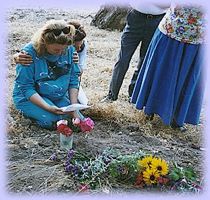
Sometimes it helps to intentionally pursue humor in books like these or in funny movies. Sometimes humor comes naturally when least expected.
When my beloved cat Katie died in 1995, I held a funeral at the time of her burial. I am extremely fortunate to have had several dear friends with me, including my dog "nephew" Dudley.
The rituals that afternoon included the singing of Amazing Grace by one of my friends, followed by my reading a poem I had written to Katie. It was in the reading of that poem that my damn burst. I cried and cried in anguish of losing her to physical death.
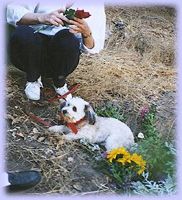
Just when I was barely catching my breath, wondering if I could ever lift above the pain, little Dudley, who had been quiet as an angel throughout the funeral, proceeded to walk directly in the center of the flowers we had placed on Katie's grave, looked right at us, lifted his leg and peed!
We laughed and laughed and thanked him for reminding us that dark grief is not all there is to living. He showed me that even I could laugh on that day, at that moment. What a wise soul and thoughtful friend he was to bring me the gift of humor!
-
Seek comfort and meaning from your spiritual beliefs and practices. Spiritual beliefs, however strong and meaningful, cannot prevent or dissolve pain, but they can change the quality of it. Over the years I have come to notice that when working with people who are grieving, the ones who seem to suffer less are those with a strong belief in the continuing life of their animal in spirit form. It is not that they experience no pain, rather that their pain seems somehow softened and tempered by the deep spiritual connection they continue to feel with their animal loved one. If you have a deep faith meaningful to you, turn to it and let it comfort you.
Sometimes, loss often brings a crisis of faith. Things we easily believed in before now may come into question. The death of someone dear to us is often a catalyst to ask questions we perhaps never thought of before, or are now thinking about with much more concern. Do animals have souls? Do they go to heaven? Will we see each other again? Do they reincarnate? And sometimes loss, especially a tragic one, brings anger. How can God do this? How can a loving God allow an animal to suffer? Or, how can my priest/rabbi/minister possibly tell me my animal has no soul, or the soul is not equal to mine, or imply that my animal's death is not as important as a human death? A crisis of faith, wondering what we really believe, what is really true about death and life after death, can add pressure and confusion to an already very overwhelming situation. Yet it also brings a powerful opportunity for growth that can change the rest of our lives.
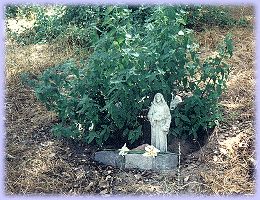 St. Francis is nestled amongst the catnip plant at a beloved cat's grave, giving comfort to the person who believes St. Francis is now watching over her animal loved one.
St. Francis is nestled amongst the catnip plant at a beloved cat's grave, giving comfort to the person who believes St. Francis is now watching over her animal loved one.We acquire our spiritual beliefs and values in two ways. As a child, we inherit the religious and spiritual beliefs of our family and culture. Sometimes we continue to hold these beliefs unconsciously, without question for our entire lifetime. Other times, triggered by a crisis or through intellectual curiosity, we may question the fit of our childhood beliefs with who we are now, what we believe and value now.
Mature value acquisition involves conscious reexamination of what is truth for us, regardless of other's opinions, and what behavior serves that truth.Our "mature truth" may or may not include childhood inherited values. An important adult right of passage is to choose our own truth and to find the courage to live by it. In the end, we must clarify our own values, choose our own beliefs, and make our own moral decisions. This is an important life task and can be a daunting in the midst of painful grief. If you are experiencing a "crisis of faith", try to surround yourself with people and other resources that will support you in seeking your own truth, and graciously deflect any admonitions from others about what you should believe.
-
Take time to be quiet with yourself. Reflect, meditate and pray on your personal beliefs about death and life after death.
-
Take comfort from the beliefs which SUPPORT you and bring you a sense of meaning.
-
Be willing to gently let go of any beliefs or traditions which don't work for you now and be open to build or invite in beliefs which do.
-
Clarify what the truth is for you at this time. Your grief cannot be healed by a process you don't believe in. Allow no one (clergy, authors, therapists, animal communicators, friends, family, etc.) to impose their beliefs about death and grief onto you. Be open to others' ideas but follow your own heart about what is right for you now.
Click here to find books on Death, Dying and Afterlife, and for Prayer Request Lines.
-
-
Animal Communication. Using the services of a professional animal communicator to help us talk with our animals when they are dying or after their death can be very comforting and can also help us make informed decisions about critical issues.
When an animal is gravely ill, many people find it very useful to discuss the following kind of information with their animal with the help of an animal communicator:
- Asking if there is anything else that might be done to make the animal more comfortable.
- Explaining treatment options (i.e. surgeries, chemo, holistic approaches) and asking for the animals' input, preferencess or choices.
- Asking the animals' preference about leaving their body on their own when the time for death comes, or whether they would like or need help through euthanasia.
- Asking the animal if they could give them a sign when they are ready or needing to leave their body. This is an important question to ask when the animal's physical condition is likely to create great pain or discomfort near the end. When both the animals and humans involved have chosen euthanasia, it can be extremely helpful for the humans to have this information about the "right" time for the animal to minimize physical or emotional pain.
- When decisions about life extending treatments or euthanasia are at hand, asking the animals to explain from their perspective what is a good "quality of life" for them. Animals are as different as humans in their opinions and desires for certain quality of life issues. Some animals don't want to live with any pain, while others are tolerant of a great deal of pain. Some animals are comfortable with living with greatly diminished physical capacities, while others might rather leave their bodies when, for instance, they are no longer able to walk. Talking with our animals about these critical choices takes the guess work out of what they feel and want.
- Asking animals if they have any preference about what is done with their remains:
- Burial or cremation?
- Placement of burial or ashes
After their animal's death, many people find it helpful to speak with them about these issues:
- What was it like for you near the end? Were you comfortable? Were you aware of all we were doing?
- When you died, did anyone meet you, help you, greet you. . . who was there? (Sometimes people ask certain beings to meet their animal, such as a Saint or animal or human loved one who has died, and take this opportunity to find out if those beings were there).
- Often people take this opportunity to express any regrets or issues they feel uncomfortable or guilty about.
- Express their deep love and gratitude for all that was shared
- Whether the animal is coming back (reincarnating), when, where, what species and particular form, and how they will find and know each other
Many people also take the opportunity to talk with surviving animals in the family to ask them how they might best be comforted in their grief, what they need or want. This is also a time people ask them if they want another animal to join the family.
Anastasia, when dying at the age of only four, told her person, "Mommy, I want my ashes buried at the place you go to meditate under the trees. When you come home from there I see the beautiful pictures of it in your mind and I feel the peace you get from there. That's where I want to be buried. Then whenever you come to meditate, we'll visit."
So, Anastasia was buried there, in a sacred forest near the sea in Carmel, California. And when her person visits there, she feels the sweet, soft love of Anastasia.
Learn more about animal communication and how it works in our section on animal communication.
To learn more about the value and experience of talking with the spirit of your animal loved ones you may want to take Teresa's teleclass, Animals' Perspectives on Death, the Other Side and Coming Back or read Penelope Smith's book Animals in Spirit.
-
The Healing Power of Ritual and Memorials. Rituals to mark the death of an animal loved one help us honor the animal, honor the primary grievers, and the honor the relationship itself between the animal and all who loved him or her. Rituals can make the real love of the relationship and the importance of the death and our grief more real and legitimate, something most cultures don't do for us automatically when an animal dies, as is done when a human dies. Rituals can be done alone, or as a gathering with others who love the animal who has died. Rituals can help us acknowledge the death, acknowledge the love exchanged, and can help us let go and move on. Rituals give us a place to embrace our pain, and to express it, sometimes in a safe circle of others who understand. Rituals give us an opportunity to tell the story of the one we loved, and the story of our life together. They can give us opportunity for closure. Rituals can be done at the time of death, soon after, a long time after the death, on anniversaries of the death, birth, or adoption, or anytime we like.
Funerals, memorial services and other rituals ~ possible elements:
- Prayer
- Meditation
- Music
- Flowers
- Candles
- Photographs, portraits of the animal who has died
- The ashes of the animal who has died
- Readings about dying, death and life after death
- Poetry
- Symbols of grievers' spiritual beliefs and practices
- Sharing the story of the animal's life
- Sharing the stories of mutual gifts and lessons experienced as a result of the relationship ~ these are the legacies which transcend death
- Special refreshments
- Other humans! (Be careful to invite only those people who truly understand and will honor the love between you and your animal. This is not a day when you should have to "tone down", rationalize or minimize the depth of your love for your animal.)
- Animals! (You may want to consider the typical behavior of the animals who might be there and whether they may be likely to disrupt or disturb any of the more quiet moments of your service.)
Other examples of ritual activities and pet loss memorials:
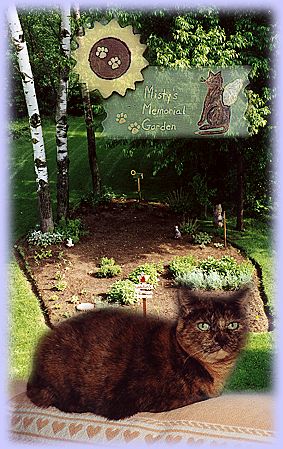 This is Misty, beloved cat of Judy, who graced the Earth from 1982-1999. The memory garden and sign were created in her honor by her devoted mother. Watch for updated photos of the garden as it grows!
This is Misty, beloved cat of Judy, who graced the Earth from 1982-1999. The memory garden and sign were created in her honor by her devoted mother. Watch for updated photos of the garden as it grows!- Planting flowers, trees or entire gardens
- Placing grave markers at the site of the burial, in your garden, or any meaningful spot
- Placing garden statuary representing your animal or spiritual belief at the burial site, your garden or other meaningful spot
- Posting a memorial tribute on the internet
- Having a beautiful portrait made and framed of the animal
- Scattering the animal's ashes in a special, sacred spot
- Creating a special photo album or story book of the animal's life
- Making a donation to your local animal shelter or rescue group. Perhaps the most meaningful way to honor our companion animal is to pass on our love to help a homeless animal in their honor.
The form and the timing of a ritual or memorial for our animal loved ones doesn't matter. What matters is that it be meaningful, that activities or elements involved are aligned with the beliefs of the primary griever or grievers (the people and animals who most loved and or lived with the animal), not what someone else thinks is appropriate. The purpose of the ritual is to honor the animal who has died, to honor the primary grievers, and to honor their relationship. Ritual ceremonies provide a place for us to give testimony to the sacred love shared between our animals and us.
For more ideas and resources on planning healing rituals, go to our Pet Loss Support Resources page and explore the following sections: Pet Loss Web Sites (to find where you can post a memorial and participate in candlelight ceremonies); Urns, Caskets, Cemeteries, Grave Markers; Aerial Dispersion of Remains.
You may want to explore classes designed to support you during your healing:
http://pet-loss-grief-counseling-certification.com/pet-loss-grief-support-classes/#individuals
The Animals' Perspectives of Death, The Other Side and Coming Back

